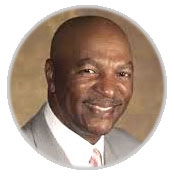Freelance Writer
May 4, 2019
As training grounds go, the Asheville (N.C.) Municipal proved a haven for hackers and accomplished strivers of the supreme arena alike. On this particular steamy July day in the Blue Ridge Mountains, both varieties of futile golf ball chasers were resplendent peacocks preening for the photographers of the local newspapers.
Several of them were assembled on the veranda of the clubhouse chirping away like old friends and foes at a reunion. In the middle of the flock stood a Hollywood handsome, tall, slender red-head whose voice would rise above the others in a Southern drawl that dripped both honey and vinegar in the same breath.
Chuck Thorpe was that often toxic combination of sweet and sour between the lines and outside of them. It was this bag of complexities that birthed both great successes and epic failures in the arena of sport and life.
George Washington Carver (Chuck) Thorpe, older brother of retired PGA Tour/Champions Tour player Jim Thorpe, transitioned this week after sustaining a massive stroke in his adopted hometown of Asheville. He was 76 years old, an exceptional talent who had a cup of coffee on the PGA Tour in the 1970s and dominated the various black golf tours for more than four decades.
“He was one of our great golfers,’’ said fellow pro James Black, who had a brief stint in the big leagues in the ‘70s, and who, like Thorpe, earned his fame on the developmental tours. “We were never trained. We stepped out on that tour which we were never trained or prepared for.’’
That’s one explanation for Thorpe’s inauspicious PGA Tour career during which he played in 61 events from 1971 (graduated from Q-School in the fall of ’71 along with TV commentator Gary McCord among others) until 1984 but never captured a win.
“He was also disobedient to himself and the game,’’ said Black, who battled Thorpe on the black tours and in money games, where a player could often win more folding money than for winning the actual tournament.
POSTER BOY FOR PROMISE
Black’s assessment of Thorpe was not unique. Many of his contemporaries would decry his lack of discipline when it came to his lack of staying power on the PGA Tour.
The book on Chuck was full of blank pages signifying unfulfilled potential.
In many ways, Chuck was the poster boy for promise unfulfilled and of the well-loved by nearly everyone except the man in the mirror.
How else could one rationalize the Roxboro (N.C.) native so blessed with natural physical gifts, including the gift of gab, yet so bent on creating mountains that forever prevented a successful climb to the perch of self-fulfillment?
“I first met Chuck in 1966 at the Skyview Open,’’ said Jerry (Hobo) Osborne, a former Tour caddie and native of Charlotte. “He was a very talented person, very personable and very outgoing. At the time he was going by Carver Thorpe. He didn’t present himself as a standout at first because there were so many other veterans who played on the tour at the time. He was basically a public course player with the ability to exhibit country club talent.’’
I met Thorpe and his four brothers, including Jim, about the same time at the Skyview Open in my hometown. I was a junior golfer with a makeshift set of clubs and a makeshift golf game with which I challenged country club juniors and usually fell short. I immediately felt a kinship with the dozens of black golfers competing in the professional division because, just like me, they had sprouted from the rich soil of the caddie ranks. Just like icons Teddy Rhodes and Charlie Sifford.
Their swings were carbon copies of the various players for whom they had caddied, except with a rhythmic flair that was more James Brown than Fred Astaire.
Besides the excess of talent, Chuck distinguished himself by the way he glided along the fairways as if he were striding on one of those moving sidewalks at the airport. His magnetic personality enabled him to hijack most of the fans in Arnold Palmer and Tiger Woods fashion, except on a much smaller scale, of course.
“Chuck was a treasure,’’ said Skyview Open Tournament Director Lee Shepard. “If you took a poll you’d find that most people loved Chuck. It’s a big loss to the golf community at large and the Skyview, where he must have won six or seven times, in particular.’’
Like me, Shepard literally grew up caddying for our heroes on the black golf tour. He idolized Chuck despite Chuck’s personal shortcomings.
“Chuck was his own worst enemy,’’ Shepard said. “Guys respected him on the course because of his unparalleled skill set. Others gravitated toward Chuck because of his personality. If you got to know him, you couldn’t help but give him that third and fourth chance.’’
A GREAT SHOT-MAKER
Many in golf circles praised Thorpe’s shot-making and unmatched creativity no doubt gleaned from his youth under the watchful eye of his father, the greenskeeper at Roxboro GC.
“Chuck was a great shot-maker,’’ said John Love, of the Charlotte Seniors. “He had great hands and great imagination.’’
Chuck’s ball striking was a combination of confidence and daring. However, it was his wedge play that produced an array of highlights and hole-outs that led to his estimated more than 50 wins.
“I can remember the Skyview when he shot 21- or 22-under for 54 holes to set the scoring record,’’ said Shepard. “The Muny was always hit or miss as far as conditioning is concerned depending on the weather. That year the fairways were pretty much grassless due to a drought, so it was concrete hard. On the short par-4 12th hole in the final round, Chuck had about 50 yards to the green after his drive, which would normally be a sand wedge or at most a little wedge for his second shot. Chuck took a 9-iron, open the face of the club and hit a little shot off the hardpan that took one hop past the pin and sucked back into the cup for a 2. It might have been one of the most amazing shots I ever saw considering the conditions.’’
No one ever questioned Thorpe’s ability on the course or his bravado off it. However, his personal demons were always the subject of scrutiny.
In my book “Uneven Lies: The Heroic Story of African Americans in Golf,’’ Jim Thorpe relates two examples of the latter.
“Two stories pretty much sum up my brother,’’ Jim Thorpe said. “I was playing in a tournament in Newport News, Va., back in the ‘60s. Chuck was hitting balls on the practice range, drawing a big gallery, because Chuck could really pipe it. Arnold Palmer was standing there talking to my Daddy and said, ‘Mr. Thorpe, there’s a million dollars’ worth of talent but that brain he’s got might not be worth 10 cents.’”
“Another time, Chuck was leading the L.A. Open. When the reporters asked him how it felt to be leading, he crossed his arms, flashed a smile and said, ‘Hell, I didn’t come to Hollywood to win no tournament. I came to be a movie star.’’’
I will remember fondly Chuck Thorpe’s brash and sass. I will also remember with awe how he would take his driver and knock up a grass tee, place his ball on it and nail a driver center-cut.
Chuck Thorpe the showman made one forget about the man hounded like most of us by character flaws, if only for a while.
In that respect, he never came up short.
VIEW CHUCK THORPE DEATH NOTICE
Pete McDaniel is a veteran golf writer and best-selling author. His blogs and books are available at petemcdaniel.com
Comments on this topic may be emailed directly to Pete at gdmcd@aol.com or visit his Facebook page.



